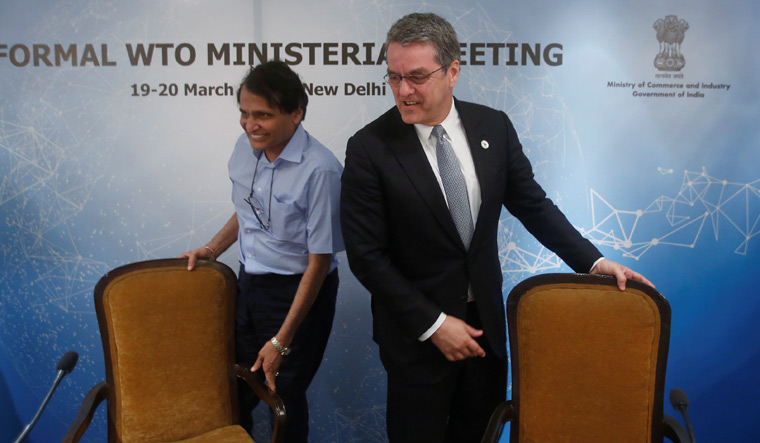An informal ministerial meet of WTO trade ministers from 53 countries at New Delhi on Tuesday called for concerted and coordinated actions to promote global trade and promote an environment of multilateralism in trade.
Most of the member countries voiced their concerns over US hiking import duty on steel and aluminium, to provide a boost to domestic manufacturers. India, along with the developing nations who are members of the WTO, said they expected these trade barriers to ease going ahead, or else they feared that it might blow up into a full-fledged trade war, a situation Commerce and Industry Minister Suresh Prabhu advised avoiding 'at all cost'.
A number of WTO members called for urgent actions in this regard and also sought to strengthen the now somewhat weakened multilateral body. The meeting saw representation from a number of African and South American nations from the developing world, and European Union, the US, China and the UK, among the developed nations.
At the conclusion of the two-day mini-ministerial, which concluded on Tuesday, countries were expected to formulate a ministerial statement from here, even though the Buenos Aires round of discussion held last year, remained mostly inconclusive.
Trade representatives of India and the US also engaged in bilateral talks on the sidelines of the mini ministerial. "We wanted to discuss the issues related to objections raised on our food subsidy and agricultural exports. Also, the issue of a recent legal notice by the US to India, seeking a cut back of an estimated $7 billion in export subsidy through various trade-related schemes," said a senior commerce ministry official, who attended the discussions.
Other nations who had sought separate bilateral discussions with India also features China. The country had sent in senior political representatives at the WTO mini-ministerial on India's invitation. "China has requested to have a separate bilateral talk later in April," said a commerce ministry spokesperson.
Prabhu said this meeting was important, considering recent trends that the world is witnessing, on countries taking unilateral actions which in long term will “harm everybody”.
"The issue of duty imposition by the US was raised today not only by us but also by a number of other members," Prabhu said, speaking at a press briefing.
Prabhu urged that there was a crucial need for all WTO members to take "urgent and coordinated action to address the underlying issues". He said, going ahead, India would also seek a wider engagement with the US authorities.
WTO Director General, Argentinian diplomat Roberto Azevedo, too, said that in recent weeks, a rise in tensions in trade relations had emerged as a real concern. "The way we see it, there is a very real potential for escalation of this trade restrictive measures, as some of the member countries also may respond in a similar manner," said Azevado.
He said in today's discussion it was attempted to dawn on members that any further escalation of trade tensions could threaten the existence of the world's largest multilateral trade body, and push global trade into an iron curtained regime.
"I think this is something we should avoid and that is what we heard today," the WTO chief said. Azevado said the problems arising would be taken up and discussed within the WTO framework. He also assured that the dispute resolution mechanism of the WTO would be made functional soon by making new appointments at vacant posts.
Along with India, today a number of other countries also voiced their concerns related to food security and a rising clamour from the developed nations to back food subsidy. Concerns about providing agriculture subsidy was also discussed with similar emotions by trade ministry representatives from a number of developing nations.
Among other issues, discussed at the two-day mini-ministerial were the issue of appointment of members on the appellate body of WTO, Doha Development Agenda revival even after the US had called it “dead”, issue of providing subsidy on fisheries, adaptation of e-commerce, investment facilitation, special and differential treatment to developing nations and gender issues.
India was earlier blamed by the US for a collapse of the WTO talks in Buenos Aires when a permanent solution to public food stockholding issue by India could not be agreed upon. India in this meeting, too, sought to prioritise a number of agriculture-related issues for discussion.
Recently, the US has imposed 25 per cent imports duty on certain steel items and 10 per cent on aluminium, seeking to deter major exporting nations of these metals to the US market.


